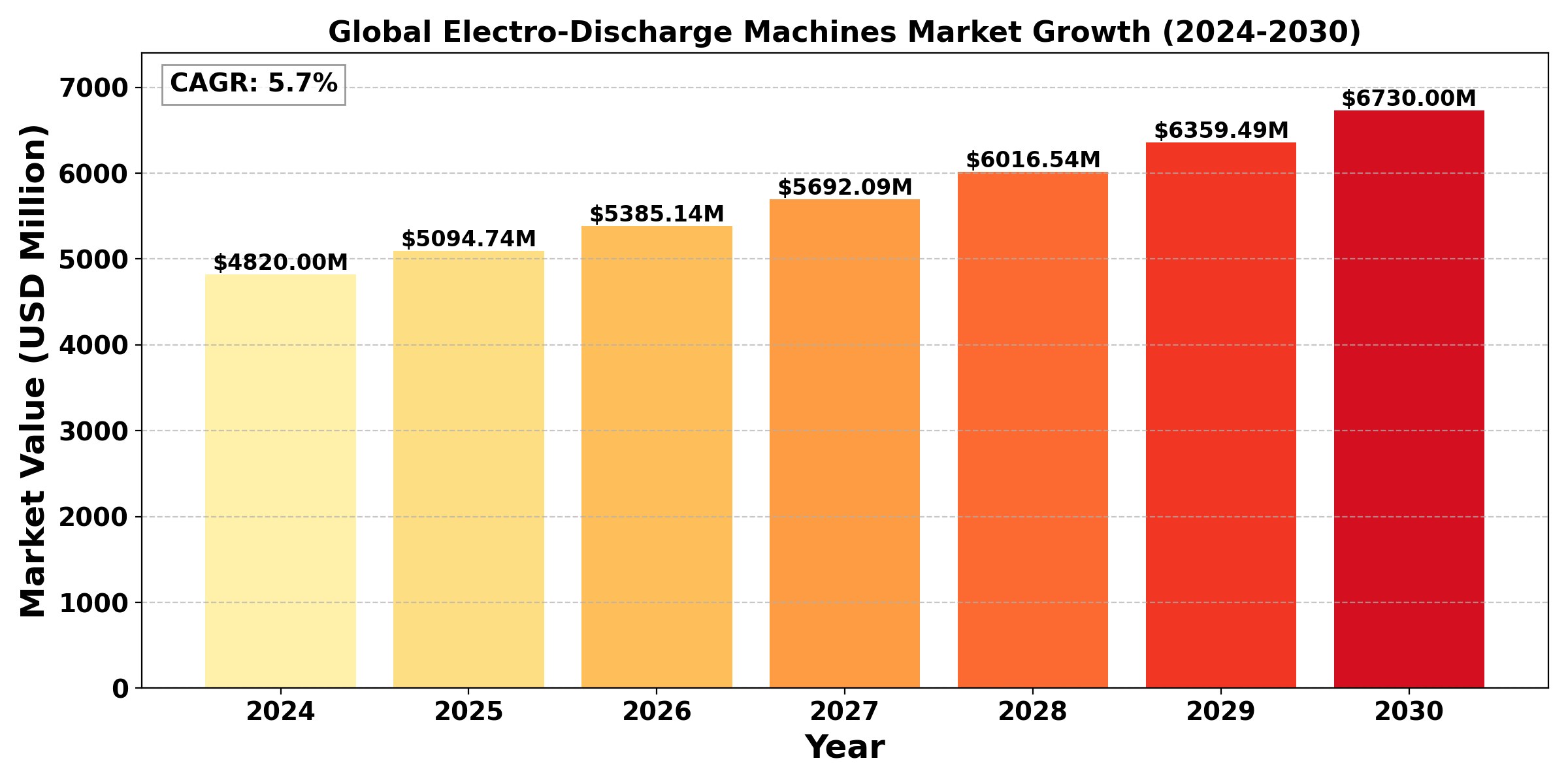TOP CATEGORY: Chemicals & Materials | Life Sciences | Banking & Finance | ICT Media

Download Report PDF Instantly
Report overview
The "Global Electro-Discharge Machines Market" size was valued at US$ 4.82 billion in 2024 and is projected to reach US$ 6.73 billion by 2030, at a CAGR of 5.7% during the forecast period 2024-2030.
The "United States Electro-Discharge Machines Market" size was valued at US$ 1.15 billion in 2024 and is projected to reach US$ 1.54 billion by 2030, at a CAGR of 5.0% during the forecast period 2024-2030.
Electro-Discharge Machines (EDMs) are precision machining tools used to shape hard metals and materials by using controlled electrical discharges. In this process, an electric current passes between a workpiece and an electrode, generating sparks that erode material from the workpiece at a microscopic level. EDM is particularly useful for manufacturing complex, delicate, or hard-to-machine parts in industries like aerospace, automotive, and mold-making, where high precision is essential. There are two primary types of EDM: sinker EDM and wire EDM, each suited to different types of applications.
The global Electro-Discharge Machines market is growing steadily, driven by increasing demand for high-precision components in aerospace and automotive sectors, growing adoption of automation in manufacturing, and advancements in EDM technology. In 2023, total unit sales reached 32,000, with Asia-Pacific, North America, and Europe accounting for 80% of global demand. The die and mold making industry remains the largest end-user at 40%, followed by aerospace at 25%. Wire EDM machines dominate with a 55% market share due to their versatility and ability to create complex shapes. The market saw a 10% increase in demand for high-speed EDM machines in 2023, reflecting the industry's focus on productivity improvements. Sinker EDM machines are growing at 6% annually, driven by their suitability for creating deep cavities and blind holes. The trend towards smart manufacturing led to a 15% rise in adoption of EDM machines with IoT capabilities for remote monitoring and predictive maintenance in 2023. Micro-EDM machines saw an 18% surge in demand, particularly in electronics and medical device manufacturing. The market is witnessing increased focus on eco-friendly EDM technologies, with a 22% growth in R&D investments for machines with reduced energy consumption and improved waste management systems.

Report Overview
Electro-Discharge Machines technology includes three main types of machining: wire, small-hole, and RAM-type (or sinker). Each of these find application in very specific areas, and several alternative technologies are competing for market share in the advanced machining sector.
This report provides a deep insight into the global Electro-Discharge Machines market covering all its essential aspects. This ranges from a macro overview of the market to micro details of the market size, competitive landscape, development trend, niche market, key market drivers and challenges, SWOT analysis, value chain analysis, etc.
The analysis helps the reader to shape the competition within the industries and strategies for the competitive environment to enhance the potential profit. Furthermore, it provides a simple framework for evaluating and accessing the position of the business organization. The report structure also focuses on the competitive landscape of the Global Electro-Discharge Machines Market, this report introduces in detail the market share, market performance, product situation, operation situation, etc. of the main players, which helps the readers in the industry to identify the main competitors and deeply understand the competition pattern of the market.
In a word, this report is a must-read for industry players, investors, researchers, consultants, business strategists, and all those who have any kind of stake or are planning to foray into the Electro-Discharge Machines market in any manner.
Global Electro-Discharge Machines Market: Market Segmentation Analysis
The research report includes specific segments by region (country), manufacturers, Type, and Application. Market segmentation creates subsets of a market based on product type, end-user or application, Geographic, and other factors. By understanding the market segments, the decision-maker can leverage this targeting in the product, sales, and marketing strategies. Market segments can power your product development cycles by informing how you create product offerings for different segments.
Key Company